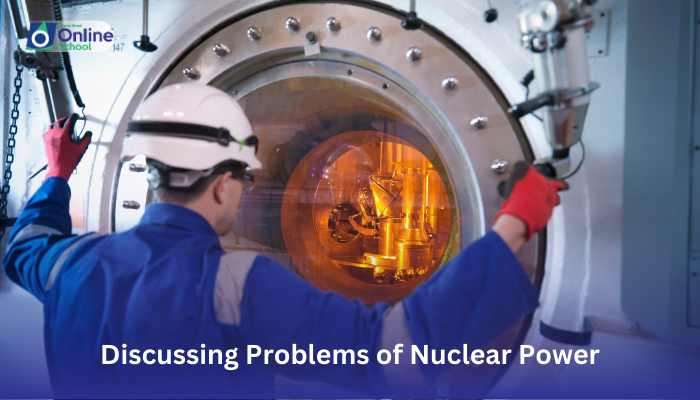
Learning Outcomes:
i. Identify and explain the key problems associated with using nuclear power, including safety concerns and waste disposal challenges.
ii. Analyze the potential consequences of nuclear accidents and the ethical implications of radioactive waste management.
iii. Appreciate the importance of informed decision-making and responsible energy choices in light of the challenges of nuclear power.
Introduction:
Imagine a powerful force, capable of illuminating homes and driving progress. Yet, within its brilliance lies a shadow, a whisper of risk and uncertainty. This force is nuclear power, a technology that has both revolutionized energy generation and sparked debate over its safety and sustainability. Today, we delve into the shadows of this double-edged sword, examining the problems associated with nuclear power and fostering critical thinking about its role in our energy future.
i. A Shadow of Risk: Safety Concerns:
The most potent concern surrounding nuclear power lies in the potential for accidents. Accidents like Chernobyl and Fukushima have left indelible scars on our collective memory, highlighting the devastating consequences of reactor malfunctions and radioactive leaks. These accidents raise concerns about:
Radiation exposure: Accidents can release radioactive material into the environment, posing immediate and long-term health risks to people and ecosystems.
Environmental contamination: Radioactive waste can pollute land, water, and food chains, causing lasting environmental damage.
Social and economic impacts: Accidents can lead to widespread fear, displacement, and economic hardship for affected communities.
ii. The Burden of the Future: Waste Disposal:
Nuclear power generates radioactive waste, a legacy that persists for millennia. This waste presents a unique challenge:
Long-term storage: Current technology lacks a permanent solution for storing radioactive waste safely and securely over extended periods.
Geological disposal: Storing waste in deep underground repositories raises concerns about potential leaks and environmental contamination.
Intergenerational responsibility: The burden of managing radioactive waste falls on future generations, raising ethical questions about our responsibility for their well-being.
iii. Beyond Technology: Ethical Dilemmas:
The potential for nuclear weapon proliferation adds another layer of complexity to the debate. Concerns include:
Dual-use technology: Nuclear technology can be used for both peaceful and military purposes, blurring the lines and raising concerns about misuse.
Security and safeguards: Ensuring the security of nuclear materials and preventing their diversion for weapons programs is crucial but challenging.
Global responsibility: The use of nuclear power by one nation can have global consequences, prompting discussions about international cooperation and non-proliferation efforts.
Nuclear power remains a complex issue with no easy answers. While it offers a low-carbon energy source and potential energy security, the shadows of safety concerns, waste disposal challenges, and ethical dilemmas cannot be ignored. Embracing informed decision-making through open dialogue, rigorous safety measures, and responsible waste management is crucial as we navigate the nuclear landscape and strive for a sustainable energy future. Remember, the choice we make today about nuclear power echoes not just in our time, but for generations to come.